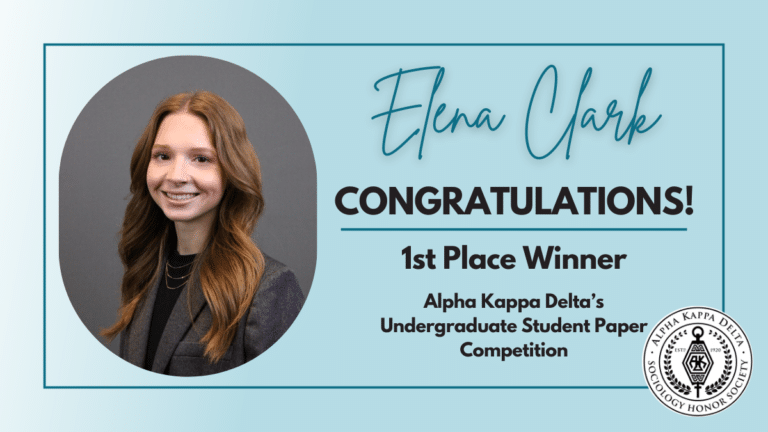
Editorial Note:
This blog feature was created by the Alpha Kappa Delta (AKD) Media Editor, Stephanie Wilson, in celebration of the first place winner in AKD’s 2024 undergraduate student paper competition, Elena Clark.
Each year AKD sponsors an undergraduate student paper competition. Winners are eligible to win cash prizes and travel money to attend the American Sociological Association annual conference. The first place winner received $500 and up to $1,000 in travel expenses to the 2024 annual meeting of the American Sociological Association.
Continue reading to learn more about Elena Clark’s winning paper!
Meet Elena Clark

Elena Clark is a recent graduate of Southwestern University’s Department of Sociology & Anthropology. Her paper titled “‘Freedom of the streets’ or ‘Barriers to success?’ Factors that Predict Attitudes About Homelessness In The United States” earned her a first place prize in our 2024 Undergraduate Student Paper Competition. We would also like to acknowledge Elena’s faculty mentor for the project, Dr. Maria R. Lowe, for her dedication to student success!
To learn more about Elena and her research, we reached out for a brief interview. Continue reading below to learn more about Elena, her award-winning paper, and her experiences as a sociology student! You can also connect with Elena on Instagram.
Can you briefly summarize your award-winning paper?
Using quantitative and qualitative data, this paper analyzes factors predicting Americans’ views on the causes of homelessness in the United States. My work expands on prior studies, incorporating a mixed-methods approach, and explores how political views and attitudes about government intervention shape Americans’ beliefs about the causes of homelessness. Using a national survey of 400 respondents, findings show that compared to liberals, conservatives and moderates are more likely to believe that homelessness is caused solely by individual factors.
Additionally, respondents arguing the government bears responsibility for aiding unhoused people are less likely to believe that homelessness is caused solely by individual factors. With a rise in the criminalization of homelessness, there is an increased need to understand public perceptions of homelessness. This study contributes to a wider discussion on social/economic issues contributing to homelessness and the responsibility of the U.S. government to help its most financially vulnerable citizens.
What motivated you to write on the topic of your paper?
Both my personal and professional experiences have influenced my research on this topic. Growing up in San Antonio, Texas, and frequenting downtown, I would often see people who were experiencing homelessness. Additionally, the church I grew up attending was very involved with the homeless community and supports two separate organizations supporting homelessness. During my childhood, I was involved in some of these efforts. I have also had people in my life who have experienced homelessness. Finally, in the summer of 2023, I interned at an organization supporting people who experience homelessness through a variety of services including a day center, food and health services, and harm reduction. These life experiences have led me to the research I am doing now, about a population that is deeply misunderstood.
As a sociology student, what has been your favorite class and why?
My favorite course was something very different than what my capstone research had to do with. It was called Childhood and Youth. In this course, we conducted field observations within a middle school setting. This is where I fell in love with sociology and the significance of qualitative research.
What have been your biggest “aha” moments while studying sociology?
There are a lot of learning moments that stick out to me from my sociology courses. However, one that stuck out to me during my time at Southwestern University was how socially constructed systems of oppression are present in every aspect of society. It made me think more deeply about how these systems existed outside of what I had ever experienced or witnessed, and how invisible forces shape social dynamics. It allowed me to develop a capacity for critical thinking and empathy which I had not considered before.
If you had to choose one concept, theory, or idea from sociology that has had the biggest impact on how you view the world around you, what would it be and why?
My answer to the previous question answers this well, but I’ll give additional context. The concept of socially constructed systems of oppression has impacted how I view the world around me. I’ve come to learn and realize how deeply these systems/institutions permeate our interactions. They shape the way we perceive and interact with those around us. And, while we may not be able to completely dismantle these systems at this immediate moment, we can recognize our own biases to foster a more inclusive environment.